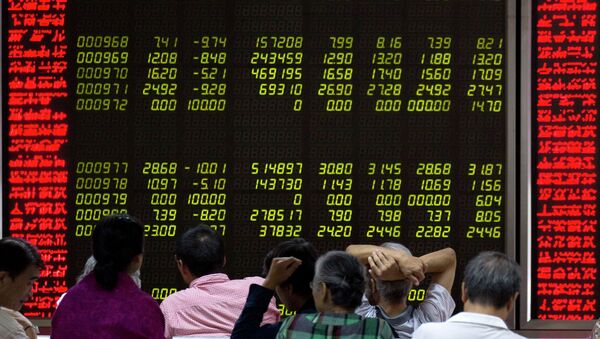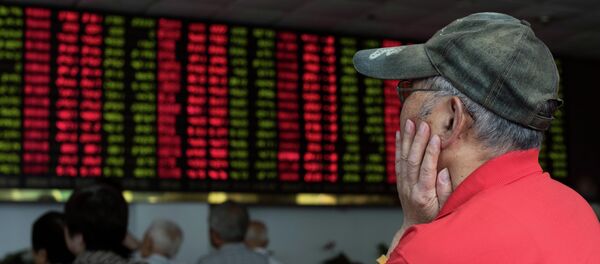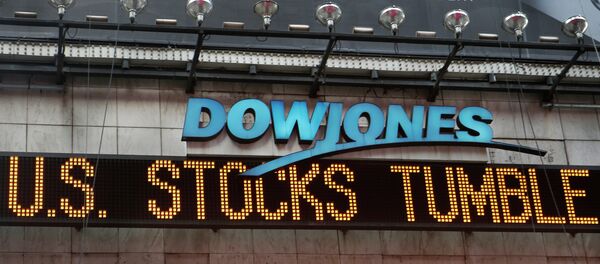Kristian Rouz – Stock markets are retreating worldwide as an aftereffect of mainland China’s economic fallout, with spillovers affecting developing nations’ currencies and most commodities, while safe haven assets like advanced nations’ governmental debt and precious metals are rallying on investors’ fears.
Amidst signs of panic in the energy sector and financials, however, the broader situation is far from a disaster: developed economies are growing at a mediocre pace, while rest of world is merely struggling for competitiveness with sharp devaluations of national assets, attempting to spur growth and attract investment at the expense of withering consumption and soaring inflation.
However, markets still have a lot to lose before the situation deteriorates to the point where a full-blown collapse occurs. For now, it is still more of an adjustment to the ‘new mediocrity’ in the advanced nations’ economic expansion, while emerging economies all suffer of their own acute structural weakness and insufficient economic and trade diversification.
The major blow to global financial markets came from mainland China this week, where industrial production turned out to be weaker than expected. A devaluation in renminbi sent a shockwave across all major assets, ultimately resulting in global stocks wiping off their yearly gains. MSCI’s All World ACWI Index dropped 2.85%, affecting the world’s most stable index, the S&P, which also slumped about 3% on Friday.
Global commodities prices are at their 13-year lowest. Mainland China is the world’s second consumer of raw materials, and as industrial activity weakens, China’s demand for commodities declines, severely battering prices. The Bloomberg Commodity Index is at its 2002 level, yet it is still not the bottom. Capital flight from commodity assets has continued five consecutive months according to BlackRock estimates. The ongoing decline in crude prices is the most dramatic since the mid-1980s, while metals, including zinc, copper, aluminium, lead, nickel and lead are all falling on lack of demand.
Gold, however, is rising, along with another type of “safe” assets, governmental debt. Gold rose 0.74% on Friday, extending gains to $1,160.77/oz. However, it is still below this year’s highest at $1,302.25/oz, posted on 22 January, and is also below its 2011-2012 peaks at above $1,800/oz.
Governmental bonds, from Australia to the UK to the US, all gained as rising volatility in equity markets spurred demand for fixed income. Average yield on advanced nations’ debt dropped to its three-months lowest subsequently.
Although all of the aforementioned are very alarming signals for the global economy, it is far from nearing a disaster for several reasons. First, most of the current turmoil originated from emerging markets, resembling the 1998 Asian financial crisis rather than the Great Depression of 1929 or the Great Recession of 2008, both of which started in the advanced world. That said, the short-to-mid-term consequences are that the depreciating assets in developing nations will be eventually purchased at their lowest point by global corporations, and that is where it all ends.
Third, developed nations are producing significant volumes of raw materials again. The late 20th century saw advanced nations concentrate on industrial and hi-tech production, while rest of world gained a de-facto monopoly in commodities trade. Now, however, the once powerful OPEC oil cartel is no longer in control of crude price as the likes of the US, Canada, the UK, and Norway are all producing significantly more oil, while the Eurozone is standing at the verge of a fracking breakthrough. A very similar situation is happening with metals production and many other commodities.
Fourth, higher market volatility, in the US in particular, has only had a positive effect thus far, effectively slashing the speculative premium off of stocks’ valuation, especially so in the tech sector. Higher volatility makes market participants more cautious and prone to abstain from risky operations, thus contributing to longer-term sustainability.
All the aforementioned means that while global economy will expand at a slower pace, with advanced economies stuck in mediocrity and emerging markets becoming cheaper, a financial meltdown is very unlikely as markets are adjusting to this new reality. Poverty in the Third world will be exacerbated greatly due to incompetence of local governments, while lack of trust in central banks will diminish the role of monetary policies elsewhere.





